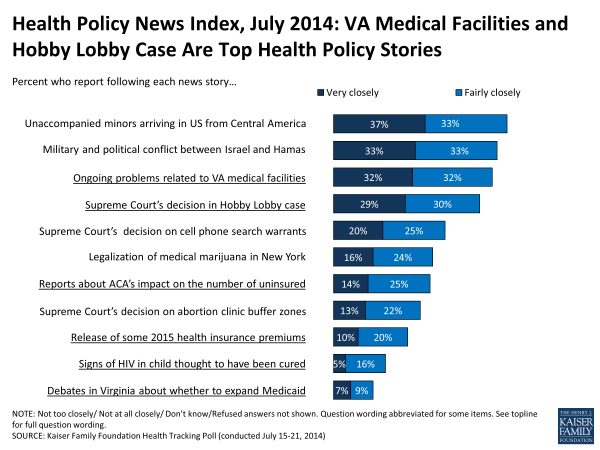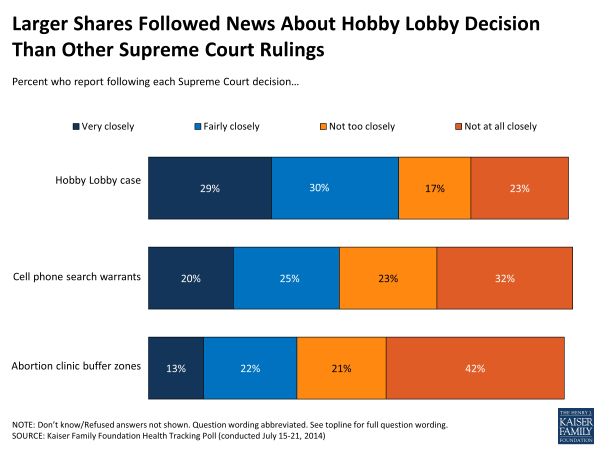Kaiser Health Policy News Index: July 2014
The Kaiser Health Policy News Index is designed to help journalists and policymakers understand which health policy-related news stories Americans are paying attention to, and what the public understands about health policy issues covered in the news. The most closely followed news stories this month were discussions about how to deal with large numbers of unaccompanied minors arriving in the U.S. from Central America (70 percent say they followed the story “very” or “fairly” closely), military and political conflict between Israel and Hamas (66 percent) and ongoing problems related to Veterans Affairs (or V.A.) medical facilities (64 percent).1 In health policy news, six in ten (59 percent) report closely following the Supreme Court’s decision in a case about whether for-profit companies should be required to cover birth control for women in their workers’ health plans (the Hobby Lobby case), which is higher than the share who say they followed news rulings in two other Supreme Court cases this month. About half of the public is able to correctly identify the Court’s decision in the Hobby Lobby case, including roughly equal shares of men and women.
The stories that captured the attention of the largest shares of the public this month were the debate over how to deal with unaccompanied minors arriving in the U.S. from Central America (70 percent report following this story “very” or “fairly” closely) and the conflict between Israel and Hamas (66 percent). A similar share of the American public (64 percent) report following the ongoing coverage of problems related to Veterans Affairs, or V.A. medical facilities and slightly fewer (59 percent) say they followed the Supreme Court’s decision in the Hobby Lobby case. Other health policy stories were lower on the public’s news radar this month, with about four in ten (39 percent) following reports about the ACA’s impact on the number of uninsured Americans, three in ten following the release of 2015 health insurance premiums by insurers in some states, and about one in six following debates in Virginia about whether to expand Medicaid (16 percent). About two in ten (21 percent) say they closely followed the announcement this month that a child who was thought to have been cured of HIV is now showing signs of infection with the virus. This is lower than the share who reported following the original story in March, when 33 percent said they closely followed the news that the child who was treated for HIV as a baby was thought to have been free of the virus at 9 months.
About six in ten Americans (59 percent) report closely following the Supreme Court’s decision in the Hobby Lobby case, a case about whether for-profit companies should be required to cover birth control for women in their workers’ health plans. Smaller shares of the public report following news of Supreme Court rulings in two other cases: one about whether police officers need a warrant to search cell phones (45 percent), and another about whether states can make laws creating buffer zones around abortion clinics (35 percent).
When asked their awareness of the Supreme Court’s decision in the Hobby Lobby case, about half of the public overall (53 percent) correctly say that the Court ruled that for-profit companies may choose not to pay for coverage of prescription birth control in their workers’ health plans if the company’s owner has religious objections. Two in ten (21 percent) incorrectly believe the Court decided that for-profit companies must pay for coverage of prescription birth control in their workers’ health plans and a quarter (25 percent) say they don’t know. Those who report following the news coverage of the case “very” or “fairly closely” are nearly twice as likely to correctly identify the outcome compared with those who say they followed the story “not too” or “not at all closely” (66 percent versus 35 percent).
| Table 1 | |||||||||
| Total | Gender | Party ID | Attention To Story | ||||||
| Men | Wom | Rep | Ind | Dem | Very/ Fairly closely following | Not too/ Not at all closely following | |||
| As you may know, last month the Supreme Court announced its decision in a case about whether for-profit companies should be required to cover birth control for women in their workers’ health plans. As far as you know, did the Court decide that for-profit companies…? | … must pay for coverage of prescription birth control in their workers’ health plans | 21% | 21% | 22% | 16% | 23% | 25% | 19% | 24% |
| …may choose not to pay for coverage of prescription birth control in their workers’ health plans if the company’s owner has religious objections | 53 | 55 | 52 | 62 | 52 | 52 | 66 | 35 | |
| Don’t know/Refused | 25 | 25 | 26 | 22 | 25 | 24 | 15 | 41 | |
Perhaps surprisingly, this month’s Health Policy News Index finds that women are just as likely as men to report closely following the news coverage of the Supreme Court’s decision in the Hobby Lobby case (60 percent of women and 58 percent of men), and women and men are also equally likely to correctly identify the outcome of the case (52 percent of women compared to 55 percent of men). Similar shares of Republicans, independents and Democrats report closely following the news coverage of the Court’s decision; however, Republicans are somewhat more likely to correctly identify the Court’s decision (62 percent) than Democrats and independents (52 percent each).
NOTE: These questions were asked as part of the July 2014 Kaiser Health Tracking Poll. For more results from that survey, including methods, see: Kaiser Health Tracking Poll: July 2014.
Endnotes
The July Kaiser Family Foundation Health Tracking Poll was conducted July 15-21, 2014. During this time news stories broke that were not included in our questionnaire, such as the federal appeals court case addressing the legality of health insurance subsidies offered through the federal health insurance exchange and the Malaysia Airlines flight shot down over the Ukraine- Russia border.


